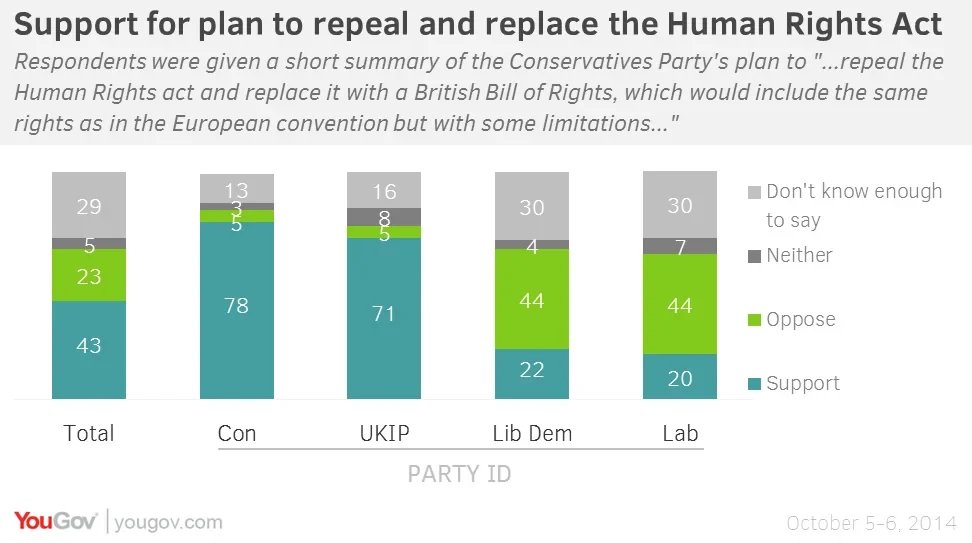Conservative plans to curb European human rights rulings are popular with the party faithful and UKIP
Last week the Conservative Party announced plans to scrap the Human Rights Act in an effort to prevent Strasbourg courts from overruling British laws on issues like allowing prisoners to vote and deporting criminals. In his speech at the Conservative conference, David Cameron said the party would seek to replace the Human Rights Act with a British “Bill of Rights”. Critics have argued that the plans are “unworkable” and will damage the UK’s reputation for defending human rights.
The move is said to be aimed at bolstering Tory credentials with Eurosceptic and UKIP-minded voters, and YouGov’s latest polling on the plan suggests it has hit its mark. Labour and Lib Dem voters are much sympathetic to the aims of the Human Rights Act, though they are not so supportive as those on the right are about scrapping it.
78% of Conservatives and 71% of UKIP voters support the repeal and replacement of the Human Rights Act, with just 5% opposed in either case. In comparison, 44% of Lib Dem and Labour voters are opposed to about 20% in favour, but 30% among both groups respond that they “Don’t know enough to say”.

Overall the public tends to oppose the idea that British courts should have to take account of the rulings of the European Court of Human Rights. Just over half of Labour and Lib Dem voters think British courts should do this, but around three-quarters of Conservatives and UKIP voters say they should not account for the rulings. The public is more divided when the prospect is raised that the ruling in question finds British laws infringing people’s human rights.
But these two opposing camps – Lib Dems and Labour voters on one hand, Conservatives and UKIP on the other – also disagree on more substantive issues. Most people in the first group believe human rights “should be protected for everyone, even people who have broken the law themselves”, the question at the heart of the debate about prisoners’ rights, while most in the second group take the opposite view. There are similar opposing majorities on the issue of whether human rights laws should apply to British armed forced stationed overseas, the subject of another controversial ECHR ruling.
A British Bill of Rights
Interestingly, these two groups tend to agree which rights should be protected as human rights, even if they can’t agree on the judicial authority with the final say on them. Majorities from across the political and demographic spectrum back the protection of 10 out of 10 key rights enshrined in the European Convention on Human Rights, from the right to freedom of expression, which 77% want protected as a human right, to the prohibition of slavery (92%) and even the right to respect for private and family life (78%).
The most controversial rights included in the survey were the right to marry and establish a family and the right not to be unlawfully arrested. A fifth (19%) of the public say these rights should not be protected as human rights, against 70% who say they should be.
Image: PA







